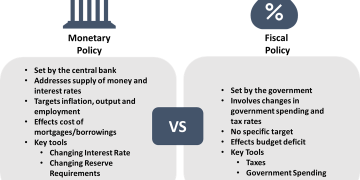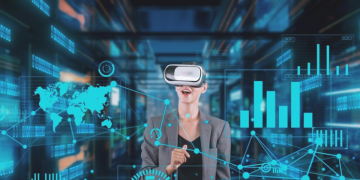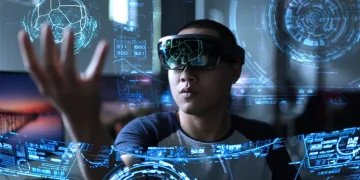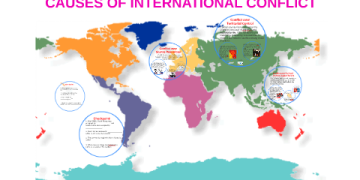Introduction
The rapid pace of technological innovation in the 21st century has fundamentally altered the global landscape, reshaping economies, societies, and geopolitics. From the internet and artificial intelligence (AI) to quantum computing and renewable energy technologies, advancements in technology are driving unprecedented change. As we look toward the future, the question arises: how will these innovations continue to affect global power dynamics?
In the past, technological supremacy often equated to military strength or economic dominance. However, in the modern age, technological innovation has become a key determinant of power in both soft and hard forms. The countries that lead in technological development and integration are poised to control the global economy, security frameworks, and political influence. This article explores the role of technology in shaping the future of global power, examining the forces driving innovation, the emerging technologies of tomorrow, and their implications for international relations.
Section 1: The Technology Revolution – A Catalyst for Change
Technological advancement has been a major driver of change throughout history. From the Industrial Revolution to the rise of the digital age, each leap forward has disrupted the global order. The 21st century is no different, with advancements in AI, robotics, and biotechnology providing new opportunities and challenges.
Artificial Intelligence: The New Frontier
AI is perhaps the most transformative technological advancement of our time. The ability to develop machines and algorithms that can learn, adapt, and perform tasks previously requiring human intelligence has profound implications for nearly every industry. From autonomous vehicles to predictive healthcare, AI has the potential to revolutionize sectors ranging from transportation to finance, manufacturing, and entertainment.
The role of AI in global power is already becoming evident. Nations that are leading in AI development, such as the United States, China, and the European Union, are positioning themselves at the forefront of the global economy. AI’s applications in military and intelligence operations also have significant implications for global security. AI-driven surveillance, cyber warfare, and even autonomous weapons are reshaping traditional notions of power and conflict.
However, the race to dominate AI has also raised concerns about the ethical and societal implications of such technologies. Issues such as data privacy, algorithmic bias, and the potential for job displacement have sparked debates about the governance of AI and its impact on human rights. The future of AI will depend not only on technological breakthroughs but also on how nations and international bodies regulate and control its use.
Quantum Computing: The Next Evolution in Computing Power
While AI has dominated the technological landscape in recent years, quantum computing is poised to become the next frontier in computational power. Unlike traditional computers, which process information in binary (0s and 1s), quantum computers use quantum bits (qubits) that can exist in multiple states simultaneously. This enables quantum computers to solve complex problems at speeds that would be unimaginable for classical computers.
Quantum computing holds enormous potential in fields such as cryptography, drug development, materials science, and artificial intelligence. For example, in cryptography, quantum computers could theoretically break encryption systems that are currently considered unbreakable. This would have profound implications for cybersecurity, and nations that lead in quantum computing will likely have an advantage in securing critical infrastructure.
In terms of global power, quantum computing could shift the balance of influence between nations. Countries that lead in quantum research, such as the US, China, and the EU, will have access to immense computational power, giving them a significant edge in both economic and strategic terms.
5G and Connectivity: The Digital Backbone of the Future
The rollout of 5G networks is another key development that is expected to reshape global power dynamics. 5G promises faster data transmission speeds, lower latency, and more reliable connections, enabling the growth of the Internet of Things (IoT), smart cities, autonomous vehicles, and connected devices. This expanded connectivity will enable new business models, enhance industrial efficiency, and improve the quality of life through innovations in healthcare, education, and communication.
However, 5G also presents significant geopolitical challenges. Countries like the United States and China are competing for dominance in the development and deployment of 5G infrastructure. The battle over 5G has become a proxy for broader technological and economic rivalry, with concerns over security risks associated with Chinese companies like Huawei. The rollout of 5G could redefine the global digital infrastructure and the balance of power in the digital age.
Section 2: Technological Hegemony – A New Arena for Global Competition
As technology becomes more central to national power, a new form of geopolitical competition is emerging. In the past, global dominance was often tied to military might, natural resources, or economic output. Today, technological superiority is increasingly seen as the key to power, as it enables countries to gain advantages in military, economic, and diplomatic arenas.
The US-China Technological Rivalry
The United States and China are the two most significant players in the global technology race. The competition between these two nations has intensified in recent years, with both striving to outpace the other in key technological sectors like AI, 5G, quantum computing, and biotechnology.
For the US, maintaining technological leadership is critical not only for its economic growth but also for its national security. The US has long been the leader in innovation, thanks to its world-class universities, research institutions, and tech companies like Google, Microsoft, and Apple. However, China’s rapid progress in fields like AI, telecoms, and e-commerce has raised concerns in Washington. The Chinese government has made significant investments in technology development through its Made in China 2025 initiative, which seeks to position China as a global leader in key industries.
China’s growing technological capabilities have led to fears in the US and Europe about losing the technological edge. The rise of Chinese tech giants like Huawei, Alibaba, and Tencent, coupled with the country’s aggressive cyber espionage efforts, has led to calls for greater scrutiny and regulation of Chinese technology companies. The technological rivalry between the US and China is set to shape the future of global power, with implications for trade, security, and diplomacy.
The Role of Emerging Powers: India and the Global Tech Landscape
India, with its rapidly growing tech sector, is also emerging as a key player in the global technology race. As the world’s largest democracy and second-largest internet user, India’s role in the digital economy is becoming increasingly important. India is home to a thriving startup ecosystem, particularly in the fields of e-commerce, fintech, and artificial intelligence. The country’s expertise in software development and IT services has already made it a key player in the global digital economy.
India’s ambitions to become a global tech leader are supported by its large pool of tech talent, vibrant innovation ecosystem, and strategic geopolitical position in the Indo-Pacific region. However, India faces challenges, including regulatory hurdles, infrastructure gaps, and the need to ensure digital inclusion for its vast rural population.
India’s growing digital capabilities also provide opportunities for closer cooperation with countries like the US, Japan, and Australia, particularly in the context of the Quad (the Quadrilateral Security Dialogue). The future of India’s role in global technology will depend on its ability to navigate the challenges of technological development while addressing concerns over data privacy, cybersecurity, and equitable access to technology.

Section 3: Technology and Soft Power – The Digital Diplomacy Shift
While technological advancements in military and economic sectors are central to the future of global power, technology also plays a crucial role in shaping a country’s soft power. In the digital age, soft power is no longer limited to cultural influence or diplomatic initiatives; it extends to digital diplomacy, information warfare, and the use of social media platforms to influence global opinion.
Digital Diplomacy and Global Influence
Countries are increasingly using technology to shape global narratives and advance their foreign policy goals. The rise of social media platforms like Twitter, Facebook, and TikTok has given governments new tools for reaching international audiences. Digital diplomacy allows governments to engage with citizens abroad, build alliances, and promote national values. However, it also poses risks, including the spread of misinformation and propaganda.
The power to shape narratives in the digital age has become a key tool of statecraft. Nations like the US, China, and Russia have all used digital diplomacy to influence political discourse, from election interference to promoting national ideologies. The rise of digital platforms as a means of communication has also led to the rise of non-state actors, including multinational tech companies, whose influence is now comparable to that of governments.
Information Warfare: The Weaponization of Technology
The use of technology in information warfare is a growing concern. Cyber-attacks, disinformation campaigns, and online manipulation are increasingly being employed as tools of geopolitical influence. The targeting of foreign elections, hacking of critical infrastructure, and the spread of fake news have become common tactics in global power struggles. Technology has provided new avenues for states to exert influence covertly, often outside the scope of traditional international law.
As technology continues to advance, the line between statecraft and cyber warfare will become increasingly blurred. International cooperation and norms around cybersecurity, data protection, and the regulation of online content will be essential in preventing the misuse of technology for geopolitical ends.
Section 4: The Future of Technology and Global Power – A Collaborative Approach
While technology is undoubtedly a key driver of global power, the future of technology and its role in shaping geopolitics will depend on how nations cooperate and navigate the challenges it presents. Rather than viewing technology as a zero-sum game, countries must recognize the potential for collaboration to address shared global challenges, such as climate change, public health, and cybersecurity.
Global Technology Governance
International cooperation on technology governance will be critical in the coming years. The rapid pace of innovation has outpaced existing regulatory frameworks, leaving gaps in areas such as data privacy, AI ethics, and cybersecurity. Global agreements, such as those under the United Nations or the World Trade Organization, will be essential in establishing norms and standards for the responsible use of technology.
Countries must work together to ensure that technological advancements benefit humanity as a whole, rather than exacerbating inequalities or creating new forms of geopolitical division. Multilateral institutions must play a role in fostering cooperation on issues like digital trade, cross-border data flows, and the protection of intellectual property.
Conclusion: Technology and the Future of Global Power
The future of global power will be defined by technological innovation and its impact on every aspect of society. Nations that lead in technological development will have the advantage in shaping the global economy, security, and political landscape. However, this power must be tempered by a commitment to international cooperation, ethical governance, and the shared goal of addressing humanity’s most pressing challenges. Technology holds immense potential for improving lives, fostering peace, and advancing prosperity—but only if it is harnessed in a way that benefits all nations and peoples.

















































